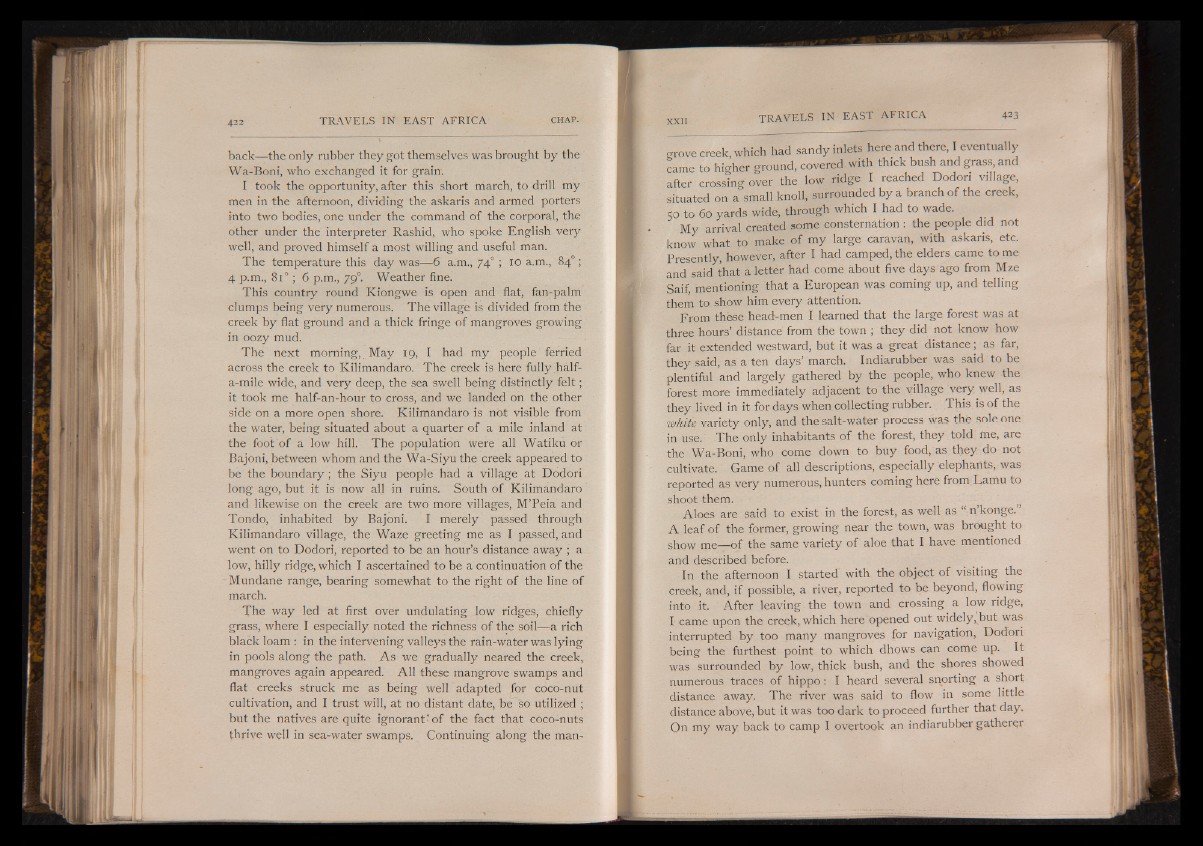
back— the only rubber they got themselves was brought by the
Wa-Boni, who exchanged it for grain.
I took the opportunity, after this short march, to drill my
men in the afternoon, dividing the askaris and armed porters
into two bodies, one under the command of the corporal, the
other under the interpreter Rashid, who spoke English very
well, and proved himself a most willing and useful man.
The temperature this day was— 6 a.m., 74o ; 10 a.m., 84°;
4 p.m., 8 i ° ; 6 p.m., 79°. Weather fine.
This country round Kiongwe is open and flat, fan-palm
clumps being very numerous. The village is divided from the
creek by flat ground and a thick fringe of mangroves growing
in oozy mud.
The next morning,. May 19, I had my people ferried
across the creek to Kilimandaro. The creek is here fully half-
a-mile wide, and very deep, the sea swell being distinctly fe lt;
it took me half-an-hour to cross, and we landed on the other
side on a more open shore. Kilimandaro is not visible from
the water, being situated about a quarter of a mile inland at
the foot of a low hill. The population were all Watiku or
Bajoni, between whom and the Wa-Siyu the creek appeared to
be the boundary; the Siyu people had a village at Dodori
long ago, but it is now all in ruins. South of Kilimandaro
and likewise on the creek are two more villages, M’Peia and
Tondo, inhabited by Bajoni. I merely passed through
Kilimandaro village, the Waze greeting me as I passed, and
went on to Dodori, reported to be an hour’s distance away ; a .
low, hilly ridge, which I ascertained to be a continuation of the
Mundane range, bearing somewhat to the right of the line of
march.
The way led at first over undulating low ridges, chiefly
grass, where I especially noted the richness of the soil— a rich
black loam : in the intervening valleys the rain-water was lying
in pools along the path. As we gradually neared the creek,
mangroves again appeared. All these mangrove swamps and
flat creeks struck me as being well adapted for coco-nut
cultivation, and I trust will, at no distant date, be so utilized ;
but the natives are quite ignorant'of the fact that coco-nuts
thrive well in sea-water swamps. Continuing along the mangrove
creek which had sandy inlets here and there, I eventually
came to higher ground, covered with thick bush and grass, and
after crossing over the low ridge I reached Dodori village,
situated on a small knoll, surrounded by a branch of the creek,
SO to 60 yards wide, through which I had to wade.
My arrival created some consternation : the people did not
know what to make of my large caravan, with askaris, etc.
Presently, however, after I had camped, the elders came to me
and said that-a letter had come about five days ago from Mze
Saif, mentioning that a European was coming up, and telling
them to show him every attention.
From these head-men I learned that thè large forest was at
three hours’ distance from the town ; they did not know how
far it extended westward, but it was a great distance ; as far,
they said, as a ten days’ march. Indiarubber was said to be
plentiful and largely gathered by the people, who knew the
forest more immediately adjacent to the village very well, as
they lived in it for days when collecting rubber. This is of the
white variety only, and the salt-water process was thè sole one
in use. The only inhabitants of the forest, they told; me, are
the Wa-Boni, who come down to buy food, as they do not
cultivate. Game of all descriptions, especially elephants, was
reported as very numerous, hunters coming here from Larnu to
shoot them.
Aloes are said to exist in the forest, as well as “ n’konge.”
A leaf of the former, growing near the town, was brought to
show me— of the same variety of aloe that I have mentioned
and described before.
In the afternoon I started with the object of visiting the
creek, and, if possible, a river, reported to be beyond, flowing
into it. After leaving the town and crossing a low ridge,
I came upon the creek, which here opened out widely,, but was
interrupted by too many mangroves for navigation, Dodori
being the furthest point to which dhows can come up. It
was surrounded by low, thick bush, and the shores showed
numerous traces of hippo : I heard several snorting a short
distance away. The river was said to flow in some little
distance above, but it was too dark to proceed further that day.
Oh my way back to camp I overtook an indiarubber gatherer